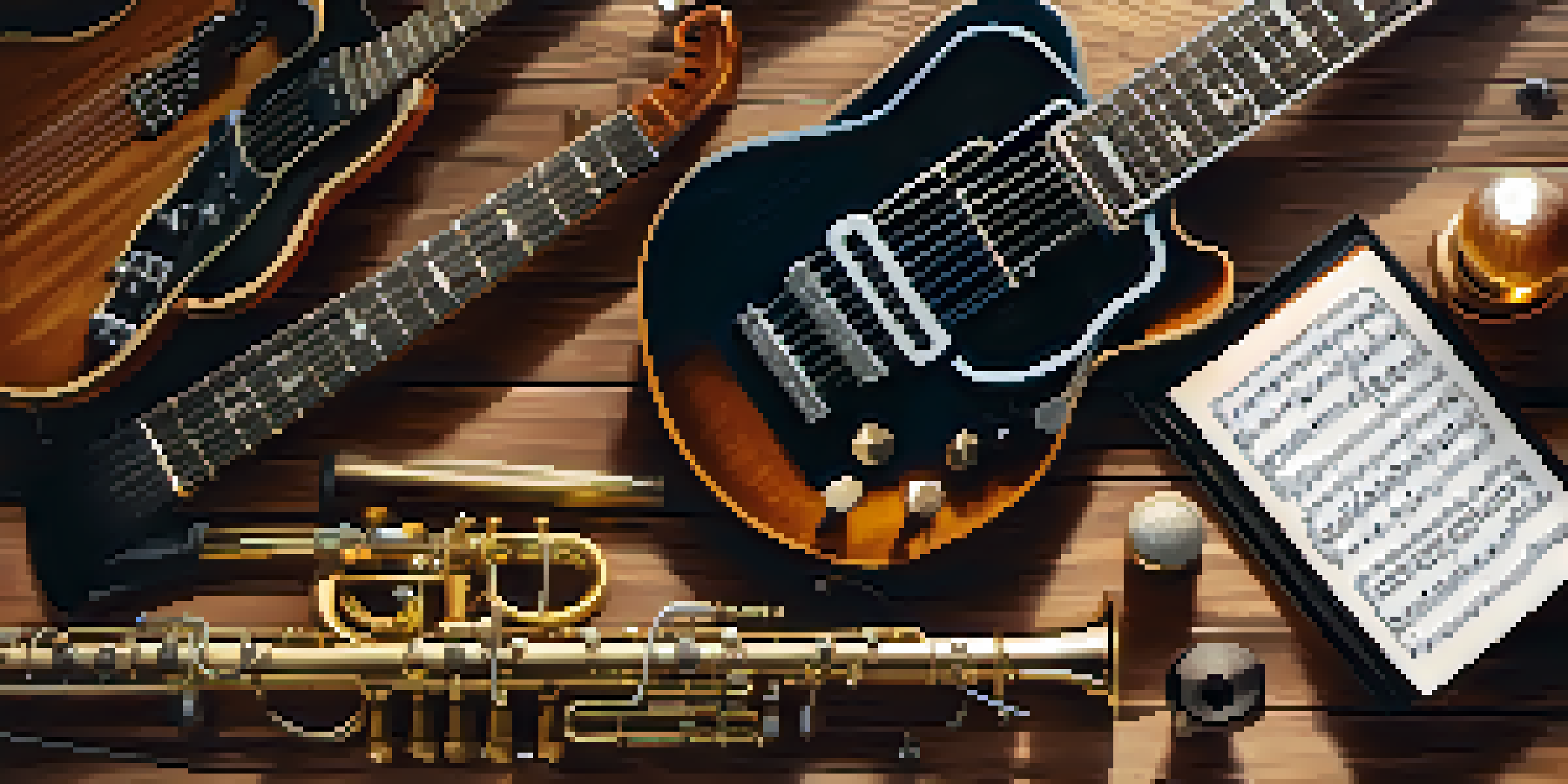The Benefits of Music Licensing for Independent Artists

Understanding Music Licensing: A Gateway for Artists
Music licensing involves giving permission for your music to be used in various media formats, such as films, commercials, and video games. For independent artists, understanding this concept can open up numerous opportunities for exposure and revenue. Think of it as a ticket to a concert that allows you to reach wider audiences beyond your usual fan base.
Music is the soundtrack of your life.
When you license your music, you essentially grant others the right to use your work while retaining ownership. This means you can earn money every time your music is played or used in a project. The beauty of this arrangement is that it allows independent artists to monetize their creativity without compromising their artistic integrity.
By exploring music licensing, independent artists can not only generate income but also gain valuable experience in the industry. The knowledge and connections gained through licensing can be instrumental in furthering your career, making it an avenue worth considering.
Financial Benefits: Turning Passion into Profit
One of the most appealing aspects of music licensing is the potential for financial gain. Independent artists can earn royalties each time their licensed music is played or used, creating a steady stream of income. This financial support can be crucial for artists trying to fund future projects or invest in their careers.

Moreover, licensing fees can provide a substantial one-time payment upfront, which can be a game changer for independent musicians. Instead of relying solely on album sales or live performances, artists can diversify their income sources, which is especially beneficial in today's ever-changing music landscape.
Music Licensing Boosts Artist Income
Licensing music allows artists to earn royalties and fees, providing a significant financial boost while maintaining creative control.
In essence, music licensing allows artists to turn their passion into profit, providing a viable financial pathway while maintaining creative control over their work. This balance is essential for independent artists looking to sustain their careers.
Expanding Reach: Connecting with New Audiences
Licensing your music can dramatically expand your reach, allowing you to connect with audiences you may never have encountered otherwise. When your song is featured in a popular TV show or movie, it can attract new listeners who are curious about the artist behind the music. This exposure can lead to increased streaming numbers and social media followers.
The music business is a cruel and shallow money trench, a long plastic hallway where thieves and pimps run free, and good men die like dogs. There's also a negative side.
Additionally, being featured in various media can build your reputation as a versatile artist. As your music gains traction in different contexts, you may find yourself attracting attention from other industry professionals, such as producers, agents, or record labels. This can lead to new collaborations and opportunities that further enhance your career.
In short, music licensing is a powerful tool for broadening your audience base. It can help independent artists gain the recognition they deserve and create lasting connections with fans around the world.
Creative Control: Maintaining Your Artistic Vision
One of the common misconceptions about music licensing is that artists lose control over their music. In reality, licensing agreements can be tailored to fit the artist's needs and preferences, allowing them to retain creative control. This means you can choose how and where your music is used, ensuring it aligns with your artistic vision.
By setting clear terms in your licensing agreements, you can protect your brand and ensure your music is used in a way that resonates with your audience. This level of control is essential for independent artists who have worked hard to develop their unique sound and identity.
Expand Your Audience Through Licensing
By featuring music in media, artists can connect with new listeners, enhancing their exposure and career opportunities.
Ultimately, music licensing offers a way for artists to share their work while staying true to their artistic beliefs. This balance fosters a healthy relationship between creativity and commercial success.
Networking Opportunities: Building Industry Connections
Engaging in music licensing can also lead to invaluable networking opportunities within the music industry. As you collaborate with various media producers, directors, and other artists, you can form relationships that may benefit your career in unexpected ways. These connections can lead to future projects, collaborations, or even mentorship opportunities.
Moreover, attending music licensing events, conferences, or workshops can introduce you to key players in the industry. Building a network of contacts can be crucial for independent artists, especially when seeking new opportunities or navigating the complexities of the music business.
In summary, music licensing not only helps you monetize your work but also enriches your professional network. This can create a support system that enhances your growth as an independent artist.
Diversifying Revenue Streams: A Smart Business Move
For independent artists, relying solely on album sales or live performances can be risky. The unpredictability of these income sources makes it essential to diversify your revenue streams. Music licensing serves as an effective strategy to supplement your income and provides a financial cushion.
By licensing your music for use in various media, you create opportunities for multiple income sources, such as sync fees, performance royalties, and mechanical royalties. This diversification can stabilize your financial situation and provide more freedom in your creative endeavors.
Networking Enhances Industry Growth
Engaging in music licensing fosters valuable connections with industry professionals, opening doors for future projects and collaborations.
Ultimately, exploring music licensing is not just a smart business move; it's a strategic way to safeguard your career and ensure your artistic vision continues to thrive.
Learning and Growth: Enhancing Your Skills as an Artist
Engaging in music licensing can also lead to personal and professional growth for independent artists. Navigating the licensing process exposes you to the business side of music, helping you develop skills in negotiation, marketing, and branding. These skills are invaluable in a competitive industry.
Additionally, working with various media projects can inspire you to create new music that aligns with current trends. This adaptability can enhance your artistry and keep your sound fresh and relevant. Learning from different experiences can fuel your creativity and keep you motivated.

In essence, music licensing not only provides financial benefits but also fosters a growth mindset for independent artists. Embracing these opportunities can elevate your career and help you evolve as an artist.
Getting Started: Steps for Independent Artists
For independent artists ready to dive into music licensing, the first step is to understand the different types of licenses available. These include synchronization licenses for film and TV, mechanical licenses for physical distribution, and performance licenses for live performances. Familiarizing yourself with these options will help you determine the best fit for your music.
Next, consider creating a catalog of your music that is ready for licensing. This could involve producing high-quality recordings, developing clear metadata, and ensuring your tracks are easily accessible through licensing platforms. Having a well-organized catalog makes it easier for potential licensees to find and use your music.
Finally, don't hesitate to reach out to licensing agencies or music supervisors who work with content creators. Building relationships with these professionals can result in more opportunities for your music to be licensed. With the right approach, independent artists can successfully navigate the world of music licensing and reap its many benefits.